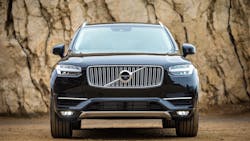What Happened in Sweden? Trump's World View and the Volvo SUV
Volvo’s luxury XC90 SUV has a quintessentially Scandinavian design. But the cabling comes from Morocco, the catalysts from South Africa, the leather keys from Portugal and its plug-in hybrid batteries from South Korea. Oh, and its owners are Chinese.
When the Swedish car manufacturer was struggling to make ends meet at the height of the global financial crisis, the government in Stockholm made no effort to help even as countries from Germany to the U.S. supported their auto industries. Eventually, Volvo was sold to China’s Geely. Just a few years earlier, local politicians had stood by as the company was sold to Ford Motor Co.
The story of Volvo--which has suppliers from around 50 countries--reflects Sweden’s love affair with globalization. Unlike U.S. President Donald Trump, most Swedish policymakers remain convinced that global competition and free trade are key to preserving the country’s status as one of the world’s most prosperous.
Competition from abroad means “our companies have been forced to adopt new ideas and new technologies, or risk going extinct,” said Johan Norberg, a Swedish author on globalization and a senior fellow at the Cato Institute in Washington. “That has been key to Sweden’s success.”
Modern Sweden may show little mercy for businesses that can’t compete, but its fabled welfare state, shaped by decades of Social Democratic rule, ensures that its workers are taken care of if they lose their jobs.
Open Policy
The high taxes needed to finance this safety net may have "had a negative effect on growth," but it has also "created greater tolerance for the job losses caused by competition and free trade,” said Lars Jonung, an economics professor at Sweden’s Lund University.
It wasn’t always like this.
Back in the 1960s and 1970s, successive governments wasted billions in taxpayers’ money trying to save jobs as the ship-building industry -- once its pride and joy -- succumbed to competition from Asia. But in the last few years, Sweden has lost both its car makers -- in 2011, Saab Automobile went belly up after the government refused to rescue it -- with hardly any regret.
Instead, the government has shored up public finances following years of mismanagement compounded by a home-brewed financial crisis in the early 1990s. Today, Sweden boasts one of the world’s lowest public debt loads.
Openness to change has helped replace old industries with international giants like Hennes & Mauritz and Ikea. Sweden has also emerged as one of the world’s biggest exporters of music and computer games, with Spotify and Minecraft now household names, thanks to an aggressive public policy encouraging computing ownership. All this in a small country of just 10 million people.
Not Perfect
Sweden’s “drawbridge down” approach is not without its challenges. In 2015, close to 160,000 asylum seekers were drawn to its generous immigration policy, meaning Sweden had welcomed almost as many refugees as the U.S., according to the United Nations High Commissioner for Refugees. Trump’s comments during a Florida speech notwithstanding, integrating such large numbers into the labor market doesn’t come without challenges, and has stoked support for the anti-immigration Sweden Democrats. Though still a pariah in Sweden’s political landscape, the party has grown to become the country’s second largest in a recent poll after entering parliament for the first time in 2010.
But even the Sweden Democrats don’t agree with Trump on trade. Party leader Jimmie Akesson said in a recent interview that the problem with having open borders is the people coming through, not the flow of capital.
According to Norberg, the solution isn’t closing borders but reforming the economy, for instance by allowing lower entry-level salaries and deregulating new sectors.
As for trade, Trump needs to reconsider his protectionist stance. The struggle in the U.S. car industry is a case in point: Efforts to protect workers from wage competition merely ended up hurting its competitiveness, Norberg said.
It’s a view shared by Sweden’s minister for enterprise and innovation, Mikael Damberg.
"It’s a mistake if the United States turns its back to the world on trade," Damberg said in a recent interview in London. "If you think you can defend the old world from technology and innovation, then over time, technology will run you over."
As for Volvo Cars, its Chinese owners have turned losses into profits. After launching a raft of new models, the company last year reported a 66 percent increase in operating profit to 11 billion kronor as global sales hit a record of more than half a million cars. Its luxury XC90 SUV is still being built in Sweden.
“No one wants to produce all of the cars in the country where they’re selling them,” said Hakan Samuelsson, chief executive officer at Volvo Cars, last month in Stockholm. “Trade barriers will always drive up the cost for consumers. One should remember that.”
About the Author
Bloomberg
Licensed content from Bloomberg, copyright 2016.
